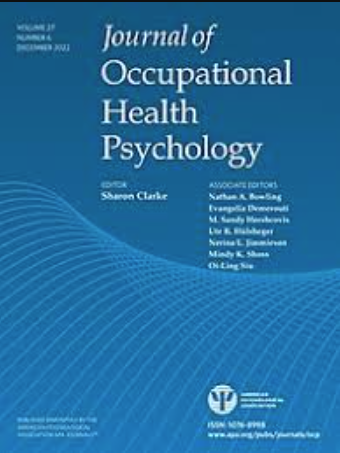Blue Monday, yellow Friday? Investigating work anticipation as an explanatory mechanism and boundary conditions of weekly affect trajectories.
IF 3.9
1区 心理学
Q1 PSYCHOLOGY, APPLIED
引用次数: 1
Abstract
Affective well-being of employees is a key outcome in the occupational health literature. Yet, researchers of emotions and affect have long called for a better understanding of the dynamic nature of such experiences. Directly addressing this call, we have built on temporal schema theories and the notion of temporal depth to develop and test the anticipation of work account as a theoretical explanation of systematic weekly change patterns in positive and negative affect. Using a 7-day experience-sampling design and latent growth curve modeling, we hypothesized and found that anticipation of work linearly decreased over the course of the workweek, so did negative affect. Supporting our hypothesis that change patterns in work anticipation drive change patterns in evening affect, the linear change trajectory of anticipation was significantly related to change trajectories in positive and negative affect. Furthermore, we identified the structure of the workweek and chronic workload as boundary conditions that interact in shaping weekly change patterns in anticipation. Specifically, patterns of decreasing anticipation were most pronounced for employees with a regular Monday-Friday workweek and high chronic levels of workload, while they were weakest for employees with a regular workweek but low levels of chronic workload. Taken together, our results highlight the role of work itself and working conditions in dynamic aspects of affect. They yield theoretical and practical implications for the study of affect and its work-related experiential and behavioral consequences. (PsycInfo Database Record (c) 2022 APA, all rights reserved).蓝色星期一,黄色星期五?研究工作预期作为解释机制和每周影响轨迹的边界条件。
员工的情感幸福感是职业健康文献中的一个关键成果。然而,情绪和情感的研究人员长期以来一直呼吁更好地理解这种体验的动态本质。直接针对这一呼吁,我们建立了时间图式理论和时间深度的概念来开发和测试工作账户的预期,作为积极和消极影响中系统的每周变化模式的理论解释。采用7天经验抽样设计和潜在增长曲线模型,我们假设并发现工作预期在一周的工作过程中呈线性下降,消极影响也是如此。工作预期变化模式驱动晚上情绪变化模式的假设得到支持,预期的线性变化轨迹与积极和消极情绪的变化轨迹显著相关。此外,我们确定了工作周的结构和长期工作量作为边界条件,在形成预期的每周变化模式中相互作用。具体来说,预期下降的模式在每周工作时间为周一至周五、长期工作量高的员工中最为明显,而在每周工作时间固定、长期工作量低的员工中表现最弱。综上所述,我们的研究结果强调了工作本身和工作条件在动态影响方面的作用。它们为研究情感及其与工作相关的经验和行为后果提供了理论和实践意义。(PsycInfo Database Record (c) 2022 APA,版权所有)。
本文章由计算机程序翻译,如有差异,请以英文原文为准。
求助全文
约1分钟内获得全文
求助全文
来源期刊
CiteScore
8.20
自引率
5.90%
发文量
46
期刊介绍:
Journal of Occupational Health Psychology offers research, theory, and public policy articles in occupational health psychology, an interdisciplinary field representing a broad range of backgrounds, interests, and specializations. Occupational health psychology concerns the application of psychology to improving the quality of work life and to protecting and promoting the safety, health, and well-being of workers. This journal focuses on the work environment, the individual, and the work-family interface.

 求助内容:
求助内容: 应助结果提醒方式:
应助结果提醒方式:


